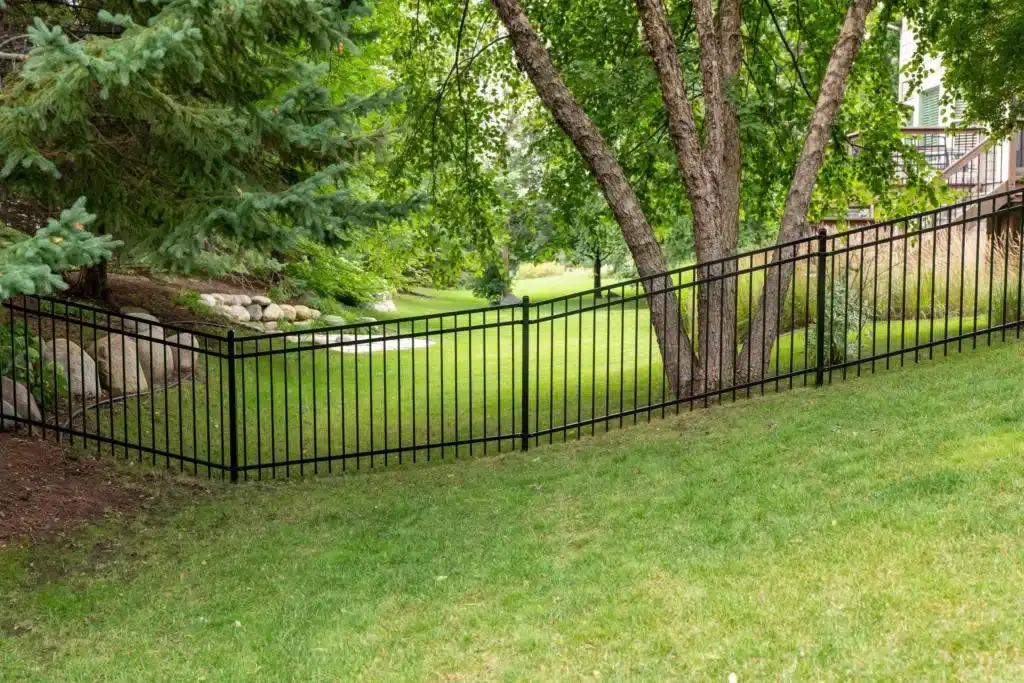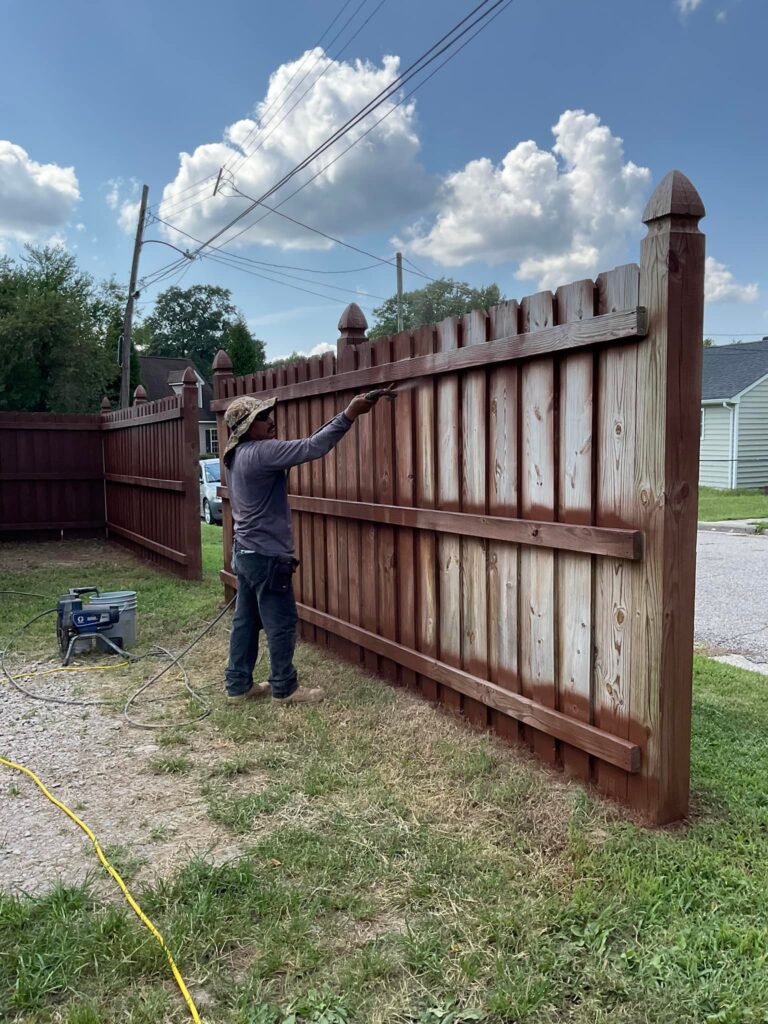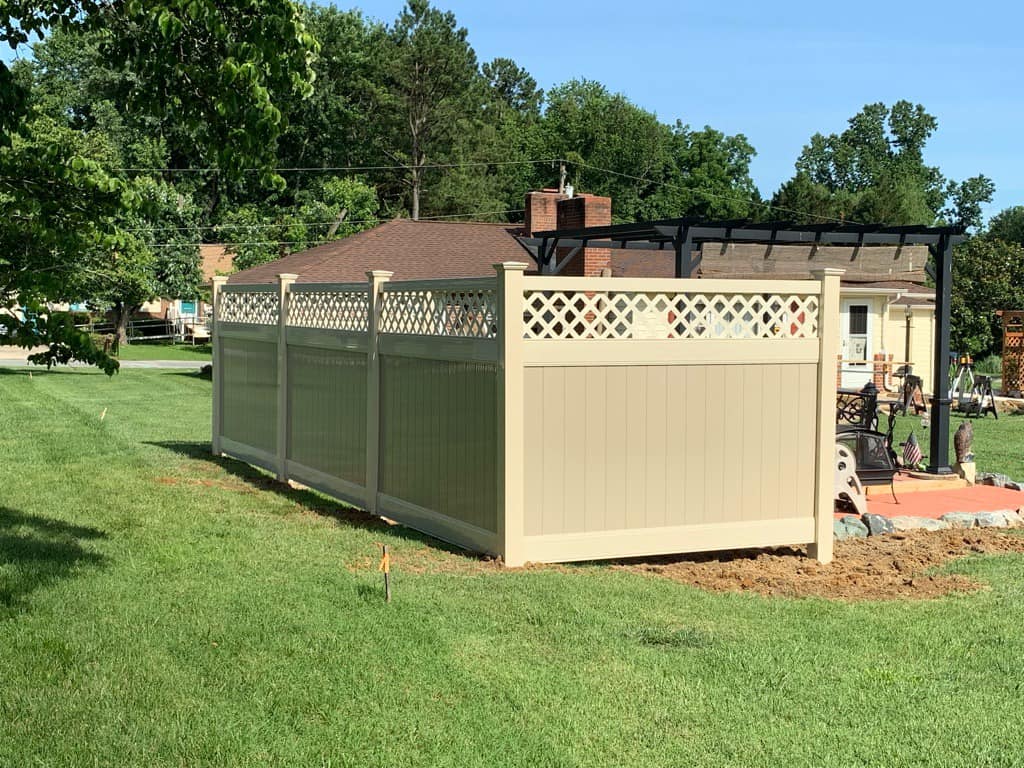DIY fence construction can result in significant structural problems that show in the first few years, and even months. While the appeal of saving money on professional fence installation services in Bensley is understandable, the reality is that DIY fence construction often leads to costly repairs, safety hazards, and premature replacement needs that far exceed the initial investment in quality contractor work.
The Foundation Failures: Post Setup Mistakes For Bensley, VA Fences

The most critical fence assembly errors occur below ground level, where poor planning creates lasting structural problems. Shallow post holes represent the primary cause of fence failure in Bensley’s clay-heavy soil conditions. Virginia’s Uniform Statewide Building Code requires fence posts to be buried at least one-third of their total height, yet DIY builders frequently dig only 18-inch holes for 6-foot fences, creating inadequate support for wind loads common along the James River corridor.
Improper spacing compounds these foundation issues. Professional fence companies understand that consistent 8-foot spacing provides optimal structural integrity, while amateur builds often feature irregular gaps that create weak points. Building inspectors routinely cite uneven post placement as a common violation in residential fence projects throughout Chesterfield County.
Concrete curing shortcuts represent another costly mistake. Clay soil conditions around Swift Creek and the Appomattox River benefit from adequate curing times for fence post concrete, yet rushed DIY projects often proceed with gate and panel mounting within hours of setting posts. This premature construction leads to post shifting and panel misalignment that requires complete reconstruction.
Terrain Troubles: Working with Bensley’s Landscape

Bensley’s rolling topography presents unique challenges that inexperienced builders consistently underestimate. Slope calculation errors occur when DIYers attempt to follow ground contours instead of using proper step-down assembly techniques. The elevation changes between Hull Street Road and the Appomattox riverfront require professional assessment to prevent fence panels from appearing crooked or creating gaps at ground level.
Drainage neglect becomes particularly problematic during Virginia’s humid summers and heavy spring rains. Amateur builders frequently ignore water flow patterns around established neighborhoods like Bensley Park, leading to post rot and foundation erosion. The Virginia Department of Environmental Quality’s stormwater management requirements specifically address the impacts of residential fencing on drainage, yet DIY projects often overlook these considerations.
Soil composition misunderstandings create long-term durability problems. Bensley’s mix of clay and sandy loam requires different post-setting techniques than standard suburban builds. Clay soil expansion and contraction cycles can destroy improperly anchored fence posts within 18 months, necessitating complete replacement rather than simple repair.
Legal and Safety Landmines
Compared to professional fencing solutions, DIY fence mistakes become much more tedious as they involve regulatory violations and utility conflicts.
- Virginia 811 utility marking requirements are legally mandatory for any excavation deeper than 12 inches, yet homeowners frequently skip this step to avoid project delays. Utility line strikes during residential projects result in significant repair costs that can reach thousands of dollars per incident.
- Property boundary disputes create lasting legal complications when DIY builders fail to obtain proper surveys. Fence-related boundary conflicts have become increasingly common in recent years, with resolution costs often reaching several thousand dollars per case. A professional fence installation company familiar with Bensley neighborhoods can routinely verify property lines through licensed surveyors, preventing these expensive legal entanglements.
- Building permit oversights occur when Bensley homeowners assume residential fence projects require no official approval. Chesterfield County’s Community Development Department requires permits for fences exceeding 6 feet in height or those installed within setback zones. Violations result in mandatory removal and reinstallation, doubling project costs while creating neighborhood relations problems.
Material and Measurement Mishaps
Poor material selection and measurement errors plague amateur fence construction projects in Bensley:
- Wrong hardware selection for Virginia’s humid climate leads to premature rust and corrosion failures. Coastal influence from the James River creates moisture conditions that require galvanized steel or aluminum components, yet DIY projects often use standard iron hardware that deteriorates within two seasons. The durability difference between proper materials and budget alternatives becomes apparent during the region’s hot, humid summers.
- Measurement compounding errors plague amateur builds when small mistakes multiply across long fence runs. A 2-inch error in the first panel placement creates a 16-inch gap by the eighth panel, requiring expensive material waste and reconstruction. Professional setup teams use string lines and laser levels to prevent these cascading problems.
- Gate mounting failures represent the most technically challenging aspect of fence construction. Proper gate hanging requires precise measurements, appropriate hardware selection, and an understanding of weight distribution principles. DIY gate assemblies typically sag within months, creating security vulnerabilities and aesthetic problems that require professional correction.
Warning Signs Your DIY Project Is Failing
- Early indicators of assembly problems include post movement during wind, panel gaps appearing at ground level, and gate operation difficulties. These symptoms typically manifest within the first season and indicate foundation problems that will worsen over time without professional intervention.
- Safety red flags require immediate attention to prevent injury and property damage. Leaning posts, loose panels, and unstable gates create hazards for children and pets while potentially damaging neighboring property during storms. Virginia’s liability laws hold property owners responsible for fence-related damage, making prompt repair essential.
- Cost calculation analysis shows that addressing DIY failures early prevents a more expensive complete reconstruction. Professional assessment fees can identify problems before they require extensive repair costs, making expert consultation a wise investment even for completed amateur projects.
When to Call Professional Fence Installation Services

Complex projects involving slopes, utility conflicts, or premium materials require professional expertise from the planning stage. Local fencing contractor’s knowledge of Bensley’s soil conditions, drainage patterns, and regulatory requirements provides value that exceeds setup cost savings from DIY attempts.
Investment protection through professional fence installation includes warranty coverage, proper permitting, and compliance with building codes that maintain property values. Quality fence companies provide guarantees on both materials and workmanship, offering long-term peace of mind that DIY projects cannot match.
The region’s specific challenges around Hull Street, Swift Creek, and established neighborhoods require expertise that comes from years of local experience and understanding of climate, soil, and regulatory factors unique to the Richmond area. Whether you need wood fence builds, chain link solutions, or decorative picket fence options, professional service ensures proper construction that withstands Virginia’s challenging climate conditions while maintaining superior aesthetics.
Frequently Asked Questions
What permits do I need for fence construction in Bensley?
Chesterfield County requires building permits for fences over 6 feet tall or within property setbacks. Contact Community Development at (804) 748-1020 for specific requirements.
How deep should fence posts be in Bensley's clay soil?
Virginia building codes require posts buried one-third of their total height, with adequate concrete curing time. Clay soil conditions may require deeper assembly for stability.
When should I hire a professional fence company versus DIY?
Complex terrain, utility conflicts, property line questions, or premium materials require fencing installation expertise. Simple straight-line projects on level ground may be suitable for experienced DIYers.
What's the average price difference between DIY and professional setup?
Expert fencing installation typically costs 40-60% more upfront but includes warranties, proper permits, and code compliance. DIY failures often cost more than professional builds to correct.
How can I get a free fence estimate for my project?
Most reputable contractors provide complimentary project assessments that evaluate your specific needs. This helps every customer understand the scope and requirements before committing to the work
Get Professional Installation Done Right

Don’t let your Bensley, VA, fence project become another DIY disaster story. Dubon Fencing & Polished Concrete LLC brings years of experience handling Bensley’s unique assembly challenges, from clay soil conditions to local building requirements. Our professional team ensures your fence project is completed correctly the first time, with proper permits, quality materials, and workmanship warranties that protect your investment for years to come.
